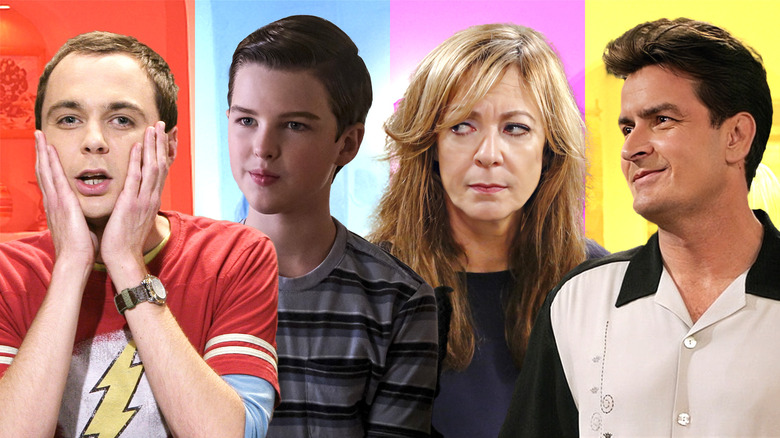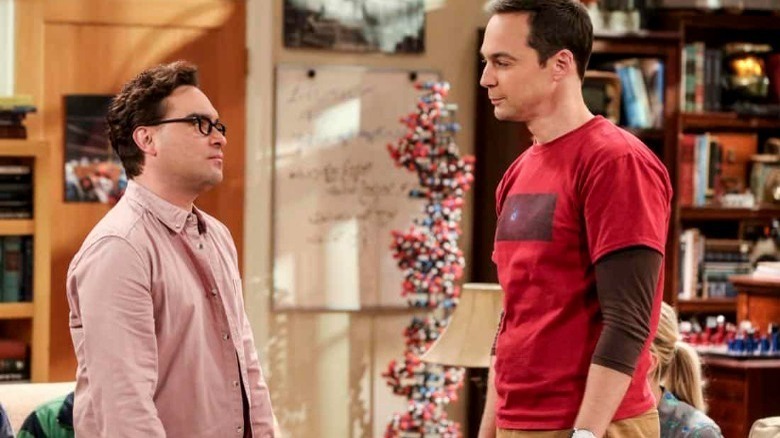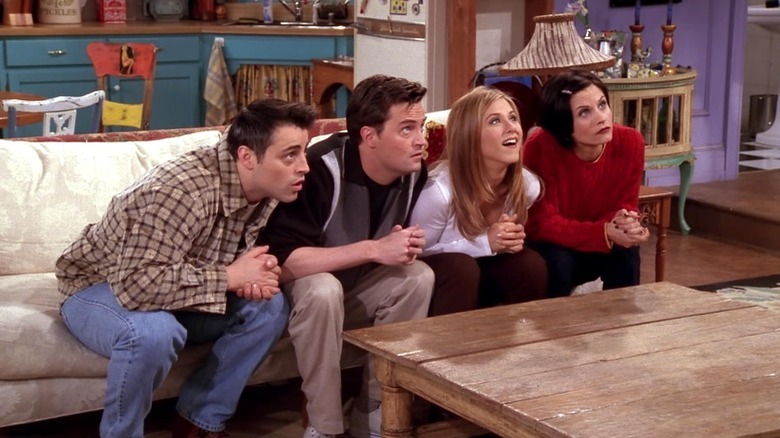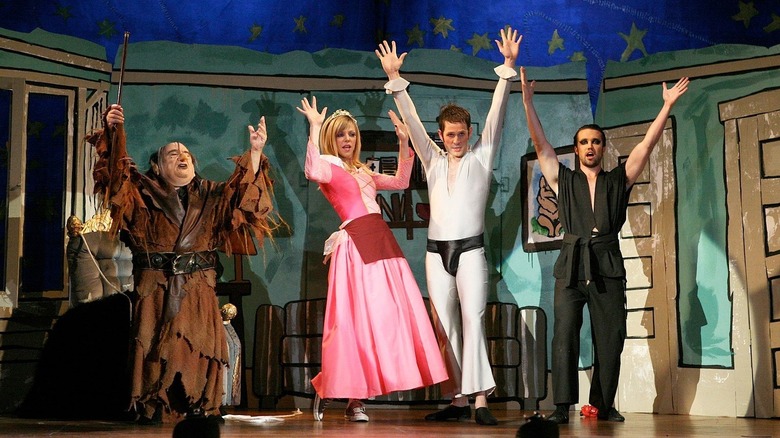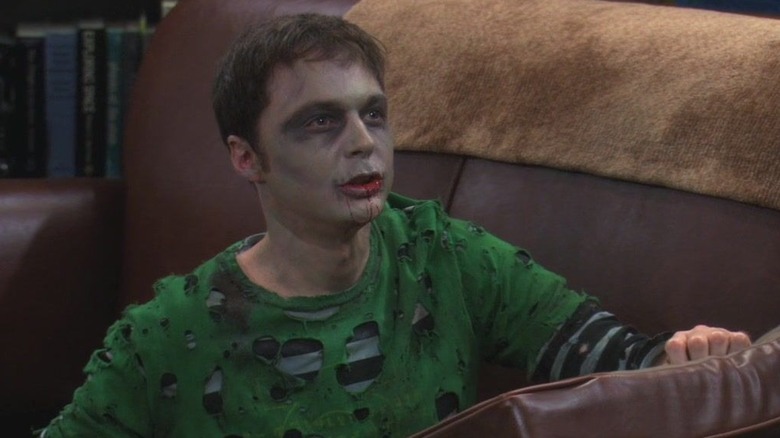Every Chuck Lorre Sitcom Has The Exact Same Problem
If you still haven't cut your cable cord and have ever landed on TBS while you're aimlessly flipping through channels, you've probably watched at least some of Chuck Lorre's shows. Responsible for massive hits like "The Big Bang Theory," "Two and a Half Men," "Mom," and "Mike and Molly," among others (he also created "The Kominsky Method," which scientifically does not appear on your television until you turn 65), Lorre has been crowned as the "king of sitcoms" throughout his career. In terms of pure numbers, that tracks. Pretty much everything Lorre touches turns to ratings gold, and some of his shows snag awards for its performers, like Jim Parsons and Allison Janney for "TBBT" and "Mom," respectively. Also, he's the man who apparently walked into CBS and said, "What if Sheldon ... but young?" and we can only assume was handed a billion-dollar check.
Lorre is prolific, but that's not necessarily a compliment. Sure, he's been around for a while — before "TBBT" and "Two and a Half Men," he was a producer on "Roseanne" and created "Cybill" and "Dharma and Greg" — but he also churns out sitcom after sitcom, and they all have the exact same problem in common. No, it's not their irritating laugh tracks. It's the fact that Lorre's jokes are flat-out mean and most of his characters are unrepentant jerks, but rather than digging into this, his shows are falsely presented as stories about friends, family, and togetherness. They're also marketed as "funny."
Chuck Lorre's sitcoms are populated with awful people and mean, unfunny jokes
Let's take "The Big Bang Theory," arguably Lorre's biggest hit, as a prime example of this issue.
Pretty much every character in this sitcom is, to put it lightly, a crappy person (particularly in regard to how male character treat female ones, which might be the show's biggest issue altogether). As the series continues, it seems bizarre that any of these people would stay friends based on how they treat one another. Sheldon (Jim Parsons) is, perhaps, the worst of them all — he seems to have nothing but contempt for his friends and loved ones, all of whom he views as utterly beneath him. Sure, he says nice stuff in the series finale. That's after 12 seasons of treating his chosen family horribly.
"Two and a Half Men," which focuses on Charlie Sheen's "hedonist" main character, is similarly odious, although the characters don't just insult each other: they're equal opportunity offenders and attack anyone who's different from them. Even the way Sheen was written off the show after he went completely off the rails in real life was unnecessarily over-the-top. In the series finale, though people believe Sheen's character (also named Charlie) had been dead for years, he nearly resurfaces only to be crushed by a falling piano. To really drive the point home that Charlie Sheen sucks, Lorre appears on-screen in a director's chair and says one of Sheen's real-life catchphrases, "Winning." Okay, Chuck. We get it, man. Just say he moved to Mongolia or something. This is embarrassing.
Chuck Lorre wants to make modern sitcoms, but he's stuck in the past
If Lorre had made "The Big Bang Theory" back when stuff like "Friends" was still on the air, it's possible nobody would have even noticed how depressingly cruel his comedy can be. That's not to say "Friends" is as mean-spirited as any of Lorre's work, because it definitely is not: the titular friends on "Friends" actually seem to like one another. The sitcom does suffer from outdated jokes that populate '90s sitcoms, but the intention behind jokes like that Monica used to be overweight or that Chandler's transgender mother is some sort of oddity isn't actually bad. In fact, according to Jennifer Aniston, those jokes were meant to mock bigotry (an explanation that definitely doesn't hold water, but whatever).
The point is that shows made in a different era are always going to age a little bit weirdly, and as long as everyone's fine with that, it's ultimately not a big deal. Recognizing that "Friends" made some problematic jokes clearly doesn't make anyone love it less, based on its enduring popularity (the reunion special just aired in 2021, after all). Lorre's sitcoms, though, seem to go out of their way to be mean-spirited, which just feels cold — especially because there is a way to do this without falling into Lorre's same pitfalls.
There are sitcoms that walk Chuck Lorre's intended tightrope correctly, but Lorre isn't involved with them
Okay, listen. Before you start firing off comments about how writers today just don't "get comedy," wait one second. We get what Chuck Lorre is going for, kind of. He just doesn't do it right.
"It's Always Sunny in Philadelphia" is one of the cruelest television shows to ever exist. The characters openly hate each other only slightly less than they hate everyone who isn't within their inner circle. They're unrepentant dirtbags who constantly try and pull off huge scams to increase their wealth or standing, only to fail because they're so stupid. There's an episode where they try to sell a painting that might be by Hitler, an episode where two characters actually end up getting addicted to crack cocaine so they can get on welfare, and an episode where one character has a funeral for a baby that never existed just for a tax write-off. One of the main characters actively stalks and terrorizes his love interest until she falls off the wagon. It's also the longest-running sitcom in television history, and it's one of the funniest shows currently airing.
"Always Sunny" has never pretended to be anything that it's not — it's a show filled with despicable people doing despicable things, but perhaps most importantly, it evolves with the times and is still delightfully cruel. The characters don't develop, and that's actually kind of great. If this is what Lorre wanted to achieve, he totally missed the mark.
Chuck Lorre's shows need to just be mean and stop pretending otherwise
"Always Sunny" takes great joy in its completely disgusting characters, which is the characteristic Lorre probably wants to emulate in his own work — except that he wants to have his cake and eat it, too. The biggest issue with say, Sheldon Cooper, is that we're supposed to root for him to end up with Amy (Mayim Bialik), win the Nobel Prize, and be the best damn scientist anyone's ever seen ... but based on his behavior, there's probably a fair amount of audience members rooting for him to fall into a ditch and disappear forever. As a stark contrast, anyone rooting for "Always Sunny" characters like Dee (Kaitlin Olson) or Dennis (Glenn Howerton), the former of whom is a textbook narcissist and the latter of whom is clearly coded as a serial killer, should probably go sit in a corner and reevaluate their choices.
As Taylor Swift recently decreed, we live in the age of the anti-hero — and while we're not asking for the Sheldon Coopers of television to go full Walter White or even full Dennis, there's other shows that tackle difficult people you still kind of like. There's the aptly named "Difficult People," or the acerbic modern rom-com "You're the Worst" (which, incidentally, features one of the darkest running gags in modern TV history), if you're looking for something not made by Chuck Lorre. Ultimately, Lorre loses this tricky tightrope walk because he wants his characters to suck while still remaining lovable. He only achieves the first one.
